
|
||||||||||||||||||||||||||||||||||||||||||||||||
|
||||||||||||||||||||||||||||||||||||||||||||||||
|
|
Archaeology sites
According to the poet Virgil, this might be your land, here you might find your history. Cuma is located in the territory of the Phlegrean Fields, (Campi Flegrei). It was founded by the Chalcis of Euboea (Greek islands of Euboea and Skyros) around 730 B.C. who were already established at Pithecusae (modern Ischia Island).
Cuma was the first Greek colony on the mainland of Italy (Magna Graecia), and the seat of the Cumaean Sibyl the priestess who was presiding over the Apollonian oracle at Cumae. (Cumean Sybil-from the ancient Greek word sibylla, meaning prophetess) During the Greek period, the city controlled a vast territory, that included the lakes of Lucrino, Fusaro, Baia, Miseno, Averno and part of the current area around Licola. The colony came under Roman rule and in 338 was granted partial citizenship. Under the Romans the city enjoyed a relative period of calm until the disasters of the Gothic Wars (535 - 554). Belisarius (a general of the Byzantine Empire) took it in 536, it was then conquered and ravaged by the Saracens in 915 becoming a pirate cove. It was definitely destroyed in 1207 by the Neapolitan army of Godfrey of Montefusco who decided to put an end to pirate raids once for all. Places to see : L'Antro di Sibilla (the Sybil's Cave, was discovered in 1932 by Amedeo Maiuri) is a massive tunnel dug into the tuff alongside the terrace that overlooks the ancient harbor bay. On the higher plateau of the Acropolis stood the so - called Temple of Jupiter, which is currently the subject of new research.
On the lower part we find the Temple of Apollo, the two were linked by a road known as the Via Sacra.
There is considerable evidence of Samnite and Roman ruins, mostly concentrated in the area of the Forum such as :
the Capitol, the ruins of the "Masseria del Gigante", the "Spa center" and the "thermal baths". History and Legends : Cuma is intimately tied to the myth of the Sibyl of Cumae and the Roman Empire.
He then led his people further north (Lazio region) outside the sphere of influence of Magna Graecia where he meet and married Lavinia, daughter of King Latinus and Amata and founded the city of Lavinium (in name of the wife) and governed over the Latins and the Trojan people.
A few centuries later Romolo and Remo descendants of Aeneas founded Rome. The Romans defeated the Greeks, took over Magna Graecia (South Italy) and gave start to the Roman Empire. Note :The Aeneid is an epic of Latin culture written by poet and philosopher Virgil in the first century BC more precisely, between 29 and 19 BC that tells the legendary story of Aeneas, the Trojan hero. Publius Vergilius Maro (October 15, 70 BC – September 21, 19 BC), usually called Virgil or Vergil was an ancient Roman poet of the Augustan period. He is known for three major works of Latin literature, the Eclogues (or Bucolics), the Georgics, and the epic Aeneid. A number of minor poems, collected in the Appendix Vergiliana, are sometimes attributed to him. Virgil is traditionally ranked as one of Rome's greatest poets. His Aeneid has been considered the national epic of ancient Rome from the time of its composition to the present day. Modeled after Homer's Iliad and Odyssey, the Aeneid follows the Trojan refugee Aeneas as he struggles to fulfill his destiny and arrive on the shores of Italy—in Roman mythology the founding act of Rome. Virgil's work has had wide and deep influence on Western literature, most notably the Divine Comedy of Dante, in which Virgil appears as Dante's guide through hell and purgatory. Excerpts adapted from Wikipedia Coming soon - other archaeological site in the region that might interest you : Battistero Paleocristiano - (near Cuma) - The thermal complex of Carminiello - The Grotto of Seiano & the ruins of the Roman residential of Pausilypon - The Greek Walls - Archaeological Park of Baia - Puteolis Neapolim - Liternum - Rione Terra - Hercolanum - Oplontis - Pompei - Stabia ...and more. - Naples Main Attractions - Basilica Carmine Maggiore | Basilica St Chiara | Basilica St Francesco di Paola | Basilica St Paolo Maggiore | Basilica St Maria della Sanita' | Chiesa del Gesu' Nuovo | Chiesa St. Domenico Maggiore | San Gennaro Cathedral | San Gregorio Armeno | St Angelo al Nilo | St Giovanni a Carbonara | St Lorenzo Maggiore | St Maria Anime al Purgatorio | St. Maria Donnaregina Vecchia | St Maria Donnaregina Nuova | St Pietro a Majella | Museum Cappella Sansevero | Naples Galleria and Royal Palace | Vulcano Vesuvio | Naples Underground | The Catacombs | The Islands - Sorrento Coast - Amalfi coast - The Hamlets in Campania - Museums - Archaeology Sites - The region - The provinces - Napoli - Caserta - Salerno - Avellino - Benevento
|

|
||||||||||||||||||||||||||||||||||||||||||||||
|
||||||||||||||||||||||||||||||||||||||||||||||||
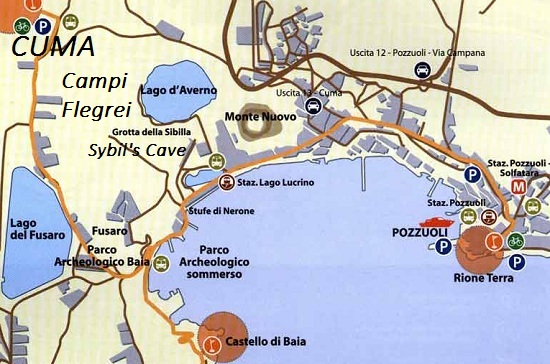
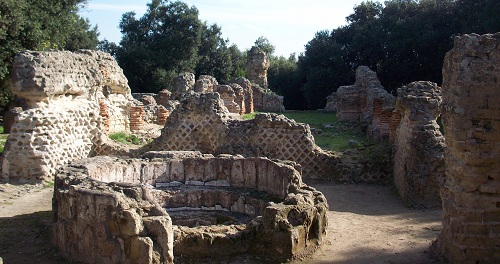
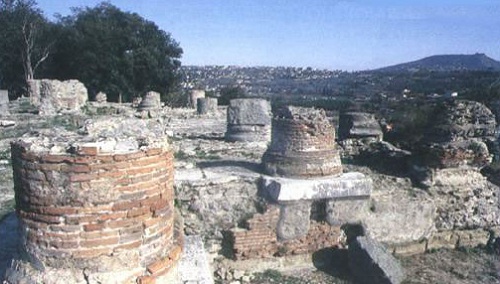
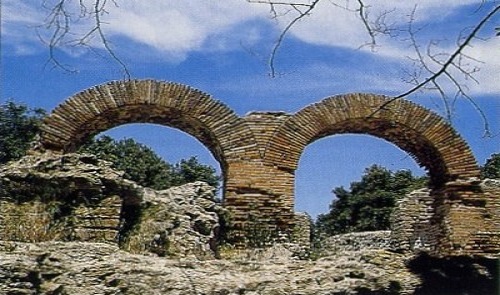
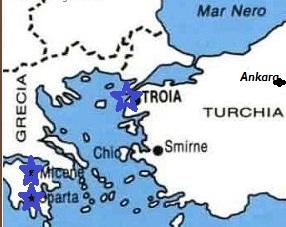 We learn from the fourth book of the Aeneid that following the destruction of Troy
We learn from the fourth book of the Aeneid that following the destruction of Troy 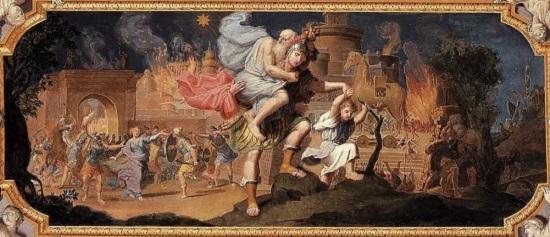
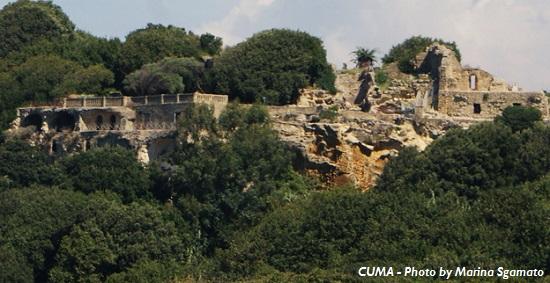
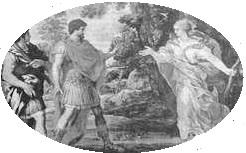 Together they entered the "land of the shadows" whose entrance was located at Avernus (nearby Lake Averno) and where Aeneas was given advice from the dead of the past, including his father Anchises.
Together they entered the "land of the shadows" whose entrance was located at Avernus (nearby Lake Averno) and where Aeneas was given advice from the dead of the past, including his father Anchises.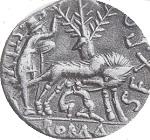 His son Ascanius, or Iulo, founded Alba Longa
His son Ascanius, or Iulo, founded Alba Longa 